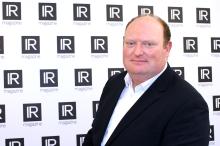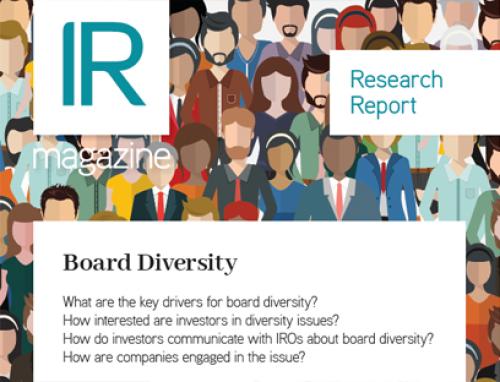Gary LaBranche bookended his five-year tenure at the top of NIRI, the world’s largest IR association, by attending the IR Magazine Awards – US in 2017 and 2022. LaBranche has been praised by NIRI for his ‘outstanding leadership’ and for strengthening the organization, advancing the IR profession and navigating through the Covid-19 pandemic.
IR Magazine asked LaBranche why he has decided to move on, what his legacy is and what’s next for both NIRI and investor relations.

Why have you resigned as president and CEO of NIRI after five years?
I wasn’t looking for a job, I was quite happy where I was. All of a sudden, I was recruited by an executive search firm and one thing led to another. [The new role] is not exactly investor relations; it’s generally in the business, financial community. The group is about four times the size of NIRI so it’s a great opportunity in a very dynamic industry. It’s a good fit for me in terms of my skills and where I am in my career arc so, after I considered it, I couldn’t pass it up.
Was it a difficult decision to leave NIRI for the new organization?
It was. I’ve loved working with the IR community, I really enjoy working with the NIRI boards and the board chairs. When you work in these environments, you get to know people pretty well and I love working with my team. I’ll definitely miss them a great deal.
Matt Brusch, chief operating officer at NIRI, was appointed interim president and CEO of NIRI on April 1, 2022. What happens next in finding a full-time successor?
That will be up to the board. May 31 is my last day but as of April 1, I have been a special adviser to the interim CEO. What that really means is I will hang around until the end of May and assist in the transition, help Matt understand the job and what’s required and turn over all my files. My job is to be supportive of Matt, the team and the board in the transition.
Which achievements are you most proud of during your tenure at NIRI?
We really expanded our educational programming fairly dramatically, including the IR Competency Suite of online courses that became extremely handy during the pandemic. We now sell hundreds of those units every year – they’ve been amazingly successful. We also added to our think tanks, for example, on artificial intelligence and corporate purpose, to help the community better understand an emerging trend or issue.
We’ve had some terrific public policy victories – we achieved a major victory when we turned back an SEC rulemaking proposal on section 13(F) in 2020. We rallied thousands of members to send comments and letters to the SEC and got our position across. Some [policy proposals] didn’t stick, like proxy advisory reform, but we’re still fighting that fight.
I’m also very pleased with our diversity, equity and inclusion efforts. I think NIRI has become more welcoming, open and inclusive. We have a very diverse board and we work very hard to ensure diversity is represented on committees and in programming. We’ve created the 40 Under 40 Program and the Developing Leaders Roundtable as different ways to bring people together and encourage them to build networks, all against the backdrop of the pandemic.
I wouldn’t think of it as an achievement, but the fact is that we did survive the pandemic and we had to pivot from in-person events to virtual events, which we had never done before. That was a big learning curve but we learned a lot in the process and put on some – I think – excellent programs.
We also had to change the way we worked. Our team of 15 went from the office to suddenly not being in the office. Luckily, we had already put in place things like SharePoint, Zoom, Teams and other mechanisms to allow us to work remotely. We did that for business continuity purposes, however, not because we were planning for a pandemic. We closed out on a Friday and opened up on Monday and were able to work remotely together. That was a really tough year, learning all that and putting our conferences into virtual formats, but we did it. I think we served the community well in that very difficult time.

Tara Dziedzic, New York Stock
Exchange; Gary LaBranche, NIRI
How has the IR space evolved over the past five years, and what do you expect to trend in the next five?
It’s been amazing to me to watch the evolution of ESG in this space. When I arrived, I started asking about ESG and listening for the answers. I was told members didn’t believe it, that it only really mattered to investors. It was kind of a fringe movement. [For members], it was a source of aggravation, extra work and filling out surveys and forms that never really amounted to anything.
I heard it was a pain point. People didn’t understand why it was a growing trend. They didn’t see it as a cause-and-effect issue in their lives and in their companies. I figured it was a responsibility for the organization to help lead to a better understanding of that topic so we started to target and evaluate ESG, get people talking about it. The more we did, the more people became curious about it, and it was rapidly developing all around us so our timing was right.
We did a conference on ESG and issued an ESG policy short shortly after that. It’s grown since then and we don’t put on any conferences now that don’t mention ESG. It’s ubiquitous and with the SEC climate risk disclosure [proposals], it’s in the compliance area, so it was important people got up to speed and understood ESG as an issue and an opportunity. The IR community is going to need to grapple with what it reports, how it reports it and how it measures it because it will be a substantial and important part of the reporting structure. That is one of the big areas of change and it’s here to stay for the foreseeable future. Members will be grappling with it for the next generation.
What does the SEC’s climate disclosure rules proposal really mean for IROs?
Climate risk disclosures will mean different things for different companies. Our starting position is always that one size does not fit all. A billion-dollar company is very different from a trillion-dollar company so we try to bring the voice of the entirety of the capital market structure to public policy. We’ll certainly make sure the diversity of companies is represented in whatever we write and we’ll fight for a rulemaking that brings a more equitable approach to requiring companies to report on these issues.
The one thing I will say, based on my first reading and from what I’ve heard in speaking with others, is that every issuer should, right now, be very clear that whatever they say on E, S or G, they will be held accountable for. You’re going to need replicable measurements and metrics that you can use to measure over time and be able to substantiate that measurement.
This disclosure will be part of your 10K so it’s important you get it right – it’s all later discoverable and the potential subject of litigation, so you’ve got to get it right. Companies will be held accountable for whatever they say and whatever goals they set. If they want to be carbon-neutral by 2050, that’s great, but then you really have to have a plan and show progress toward it.

What more needs to be done to engage with retail investors and activist investors, and promote ESG?
It’s clear there is a new wave of retail investors who are engaging through social media. Prior to this, the average retail investor who owned five or 100 shares probably didn’t really manage to impact the IR practitioner on a daily basis. But a few thousand small shareholders heavily engaged on a social media platform and amplifying their voice became hundreds of thousands or even millions of shares. In some cases, that can be very meaningful and impact employees and other shareholders, even consumers. That is kind of the new area we’re going to have to grapple with and learn how to grapple with rather quickly.
What advice would you give your successor to do the job of president and CEO of NIRI most successfully?
I always hesitate to give advice to a successor. He or she must be true to him or herself. When I go to a new job, as I will, my guiding light is to shut up a lot. Shut up and listen, ask questions and then shut up and listen to the answers. It’s really important to give people the opportunity to let them tell you about their job and what they do and what the organization is like.
I always advise new CEOs to spend a lot of time asking questions and listening to the answers. You know, associations didn’t just arrive overnight. They are cumulative cultures based on years and decades of development. You need to spend the time to learn what makes them tick, and what makes the people tick, and what the customs and traditions of the organization are. So be true to yourself in paying attention to what’s around you and listen to the organizational cues and clues to make sense of it all – and you’ll do fine.










